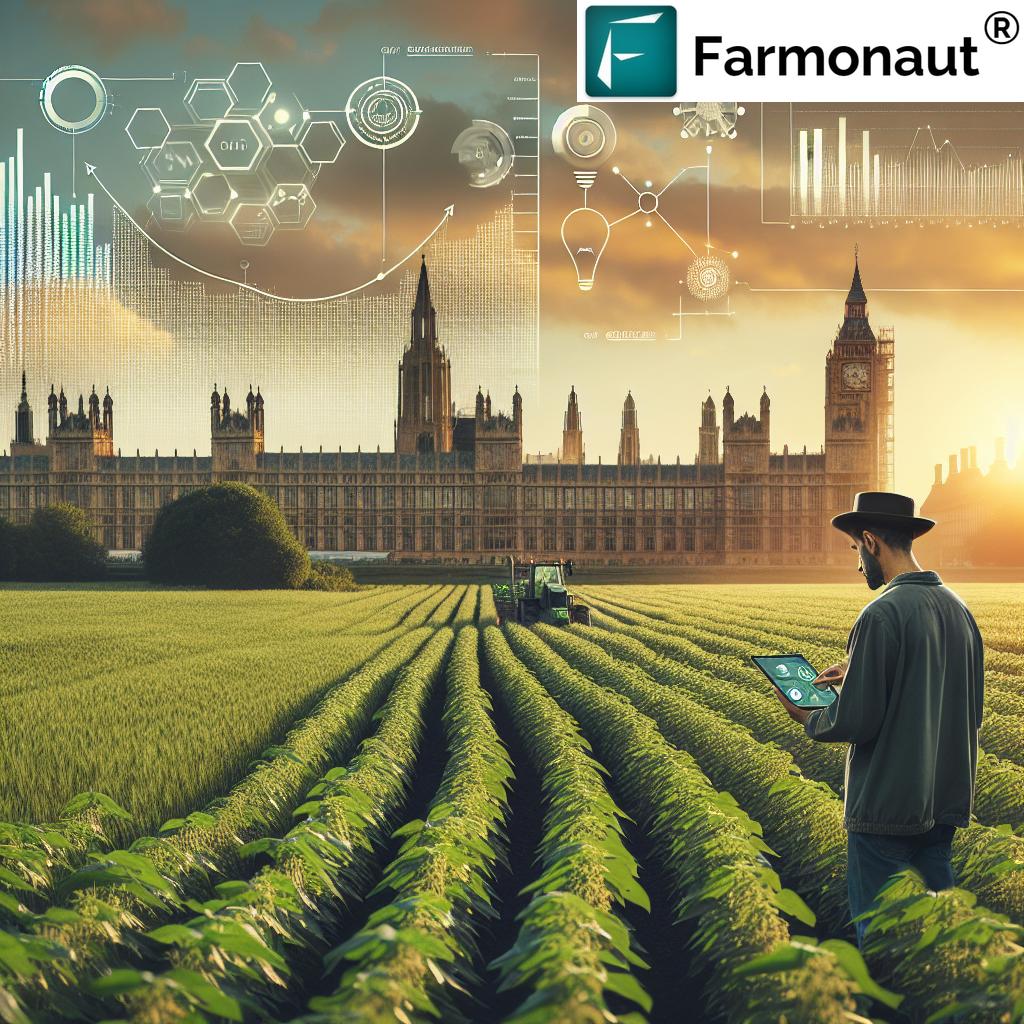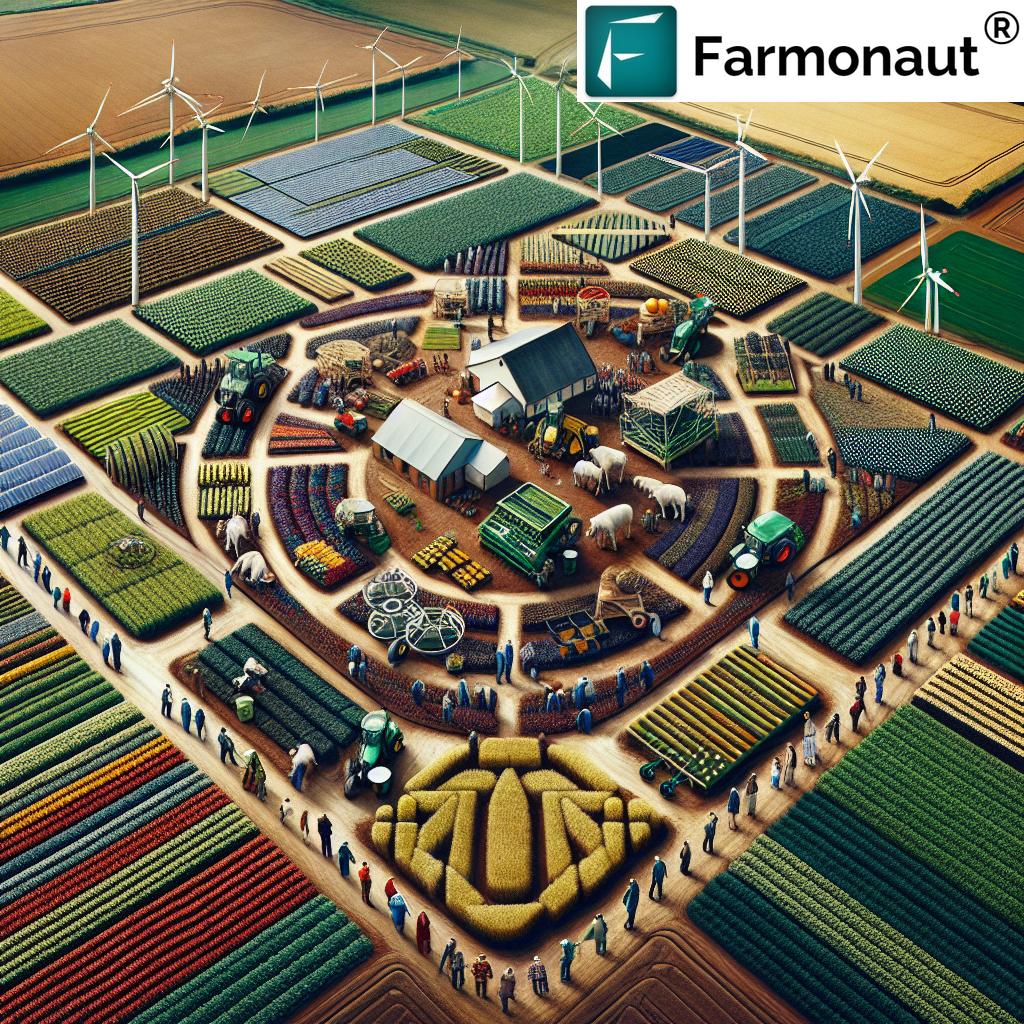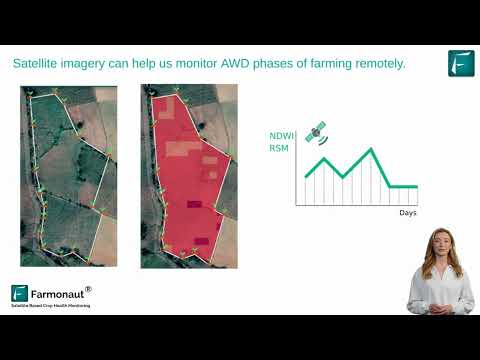Revolutionizing British Agriculture: How Farmonaut’s Agritech Solutions Drive Sustainable Farming Practices and Policy Reform

“British agricultural policy reforms impact over 70% of the UK’s land area used for farming.“
In the ever-evolving landscape of British agriculture, we find ourselves at a pivotal moment where traditional farming practices intersect with cutting-edge technology and policy reform. As a team deeply invested in the future of farming, we at Farmonaut are excited to explore how our agritech solutions are playing a crucial role in driving sustainable farming practices and influencing policy changes across the United Kingdom. In this comprehensive analysis, we’ll delve into the latest agricultural policy reforms, global market trends, and how precision farming technologies are reshaping the British agricultural sector.
The Changing Face of British Agriculture
The agricultural landscape in Britain is undergoing a significant transformation, driven by a combination of factors including:
- Brexit and its impact on agricultural trade policies
- Growing emphasis on sustainable agriculture practices
- Technological advancements in farming
- Shifting consumer preferences towards locally-sourced, environmentally-friendly produce
These changes are not just affecting individual farmers but are having a ripple effect across the entire national economy. As we navigate through these changes, it’s crucial to understand how agritech solutions, like those offered by Farmonaut, are helping to bridge the gap between traditional farming methods and the demands of modern agriculture.
Agricultural Policy Reforms: A New Era for British Farmers
Recent years have seen a flurry of activity in parliament, with several bills and amendments being proposed to reshape the agricultural sector. These reforms are aimed at creating a more sustainable, productive, and competitive farming industry in the post-Brexit era. Key aspects of these reforms include:
- Subsidy Restructuring: Moving away from the EU’s Common Agricultural Policy towards a system that rewards environmental stewardship and sustainable practices.
- Trade Policy Overhaul: Negotiating new trade agreements that balance the need for market access with protecting domestic farmers from unfair competition.
- Environmental Focus: Introducing measures to promote biodiversity, reduce carbon emissions, and improve soil health.
- Technological Integration: Encouraging the adoption of precision farming technologies to increase efficiency and reduce environmental impact.
These reforms represent a significant shift in how the government approaches agricultural policy, with a clear emphasis on sustainability, efficiency, and innovation. As we’ll explore later, Farmonaut’s suite of agritech solutions is perfectly positioned to help farmers adapt to and thrive under these new policy frameworks.
The Debate on Farming Inheritance Tax
One of the most contentious issues in recent agricultural policy discussions has been the topic of farming inheritance tax. The debate centers around balancing the need to support family farms and maintain agricultural land use with ensuring fair taxation policies. Current discussions in parliament include:
- Proposals to modify Agricultural Property Relief (APR) to better reflect modern farming practices
- Considerations for how inheritance tax policies might affect land use and farm consolidation
- Debates on the fairness of current tax breaks for agricultural land versus other business assets
As these discussions continue, it’s clear that any changes to inheritance tax policies could have far-reaching implications for the structure of British farming. Farmonaut’s data-driven insights can play a crucial role in informing these policy decisions by providing accurate, real-time information on land use and productivity.
Global Market Trends and Their Impact on British Agriculture
British agriculture doesn’t exist in a vacuum, and global market trends are having a significant impact on the sector. Some key trends we’re observing include:
- Increased Demand for Sustainable Products: Consumers worldwide are showing a preference for sustainably produced food, creating new market opportunities for British farmers.
- Volatile Commodity Prices: Global events, such as conflicts and climate change, are leading to fluctuations in commodity prices, affecting farmers’ incomes.
- Tech-Driven Agriculture: The global adoption of agritech solutions is creating a more competitive landscape, where data-driven farming is becoming the norm.
- Changing Trade Patterns: Post-Brexit, the UK is establishing new trading relationships, potentially opening up new export markets for British agricultural products.
These trends underscore the importance of adaptability and innovation in modern farming. Farmonaut’s solutions, such as our satellite-based crop monitoring and AI advisory systems, are designed to help British farmers stay competitive in this rapidly changing global market.
Precision Farming Technologies: The Future of Agriculture
“Precision farming technologies can increase crop yields by up to 30% while reducing water usage by 20-50%.“
At the heart of the agricultural revolution is the adoption of precision farming technologies. These innovative solutions are transforming how farmers manage their land, crops, and resources. Key technologies include:
- Satellite-Based Crop Monitoring: Real-time data on crop health, allowing for timely interventions and optimized resource use.
- AI-Powered Advisory Systems: Providing personalized recommendations based on data analysis and machine learning algorithms.
- IoT Sensors: Collecting on-the-ground data on soil moisture, temperature, and other critical factors.
- Drone Technology: Offering detailed aerial surveys and targeted application of inputs.
Farmonaut is at the forefront of this technological revolution, offering a comprehensive suite of precision farming tools. Our satellite-based crop health monitoring system, for instance, provides farmers with invaluable insights into their fields’ conditions, enabling them to make data-driven decisions that optimize crop yields while minimizing resource usage.
Explore Farmonaut’s precision farming solutions:
Sustainable Agriculture Practices: A Win-Win for Farmers and the Environment
Sustainability is no longer just a buzzword in agriculture; it’s becoming a necessity. The UK government’s focus on sustainable farming practices is reflected in recent policy reforms and public debates. Some key sustainable practices being promoted include:
- Crop rotation and diversification
- Reduced tillage and cover cropping
- Integrated pest management
- Precision irrigation
- Agroforestry and hedgerow restoration
Farmonaut’s agritech solutions play a crucial role in enabling these sustainable practices. Our AI-powered advisory system, for instance, can help farmers optimize their crop rotation plans based on soil health data and market trends. Similarly, our precision irrigation recommendations can significantly reduce water usage while improving crop yields.
The Role of Digital Agriculture in Addressing Global Challenges
As we face global challenges such as climate change, food security, and resource scarcity, digital agriculture innovations are emerging as a key part of the solution. These technologies are helping farmers to:
- Adapt to changing climate patterns
- Increase productivity to meet growing food demand
- Reduce the environmental impact of farming
- Improve traceability and food safety
Farmonaut’s blockchain-based traceability solution, for example, is helping to build trust in supply chains by providing transparent, verifiable data on product origins and journey. This not only addresses consumer demands for transparency but also helps in managing food safety risks.
The Impact of Agricultural Trade Policies on the National Economy
The UK’s agricultural trade policies are undergoing significant changes in the post-Brexit era. These changes have far-reaching implications for the national economy, affecting everything from food prices to rural employment. Key aspects include:
- New Trade Agreements: Negotiating deals that balance protecting domestic farmers with accessing new markets.
- Tariff Structures: Designing tariff systems that support British agriculture while ensuring competitive food prices.
- Non-Tariff Barriers: Addressing regulatory differences and standards to facilitate smooth trade.
- Support for Exports: Developing programs to help British farmers access international markets.
These trade policies are reshaping the competitive landscape for British farmers. Farmonaut’s market intelligence features can help farmers stay informed about these changes and adapt their strategies accordingly. By providing insights into global market trends and local production data, we empower farmers to make informed decisions about what to grow and when to sell.
Government Scrutiny of Public Sector Financial Accounts
Recent reports from the National Audit Office have highlighted concerns over the reliability of public sector financial accounts. This scrutiny extends to agricultural subsidies and support programs, potentially impacting how funds are allocated and managed in the farming sector. Key points of concern include:
- Accuracy of financial reporting in agricultural support programs
- Transparency in subsidy allocations
- Efficiency of fund utilization in rural development initiatives
This increased scrutiny underscores the need for robust data management and reporting systems in agriculture. Farmonaut’s platform can play a crucial role in this area by providing accurate, real-time data on farm operations, crop yields, and resource usage. This data can help both farmers and policymakers ensure that agricultural support programs are effectively targeted and efficiently managed.

The Potato Sector: A Case Study in Agricultural Innovation
The potato sector serves as an excellent example of how agricultural policy reforms and agritech solutions are transforming British farming. As one of the UK’s most important crops, potatoes have been at the forefront of innovation in recent years. Some key developments include:
- Precision Planting: Using GPS-guided machinery for optimal seed placement and spacing.
- Disease Management: Employing satellite and drone imagery to detect early signs of blight and other diseases.
- Water Management: Implementing precision irrigation systems to optimize water usage and improve tuber quality.
- Storage Solutions: Utilizing IoT sensors to monitor and control storage conditions, reducing post-harvest losses.
Farmonaut’s satellite-based crop monitoring system has been particularly beneficial for potato farmers. By providing regular updates on crop health and growth patterns, we help farmers make timely decisions on irrigation, fertilization, and pest control, leading to improved yields and quality.
The Future of British Agriculture: Trends and Predictions
As we look to the future of British agriculture, several trends and predictions emerge:
- Increased Automation: The adoption of robotics and AI in farming operations is expected to accelerate, addressing labor shortages and improving efficiency.
- Vertical Farming: Urban and indoor farming techniques are likely to gain prominence, especially for high-value crops.
- Carbon Farming: With growing emphasis on climate change mitigation, practices that sequester carbon in soil are expected to become more prevalent.
- Personalized Nutrition: Advances in genomics and data analytics may lead to the production of crops tailored to specific nutritional needs.
- Circular Economy in Agriculture: There will be a greater focus on reducing waste and maximizing resource efficiency throughout the agricultural value chain.
Farmonaut is committed to staying at the forefront of these trends. Our ongoing research and development efforts are focused on integrating emerging technologies like AI and blockchain into our platform, ensuring that British farmers have access to the most advanced agritech solutions available.
The Role of Farmonaut in Shaping the Future of British Agriculture
As we’ve explored throughout this article, Farmonaut’s agritech solutions are playing a crucial role in helping British farmers adapt to policy changes, embrace sustainable practices, and stay competitive in a global market. Our key contributions include:
- Data-Driven Decision Making: Providing farmers with real-time, actionable insights based on satellite imagery and AI analysis.
- Resource Optimization: Helping farmers reduce water and chemical usage through precision agriculture techniques.
- Sustainability Support: Offering tools to monitor and improve environmental performance, aligning with government sustainability goals.
- Market Intelligence: Keeping farmers informed about global trends and local market conditions to optimize crop selection and timing.
- Policy Compliance: Assisting farmers in navigating complex regulatory requirements through our digital record-keeping and reporting features.
By leveraging these solutions, British farmers can not only comply with new policy requirements but also thrive in an increasingly competitive and environmentally conscious market.
Comparative Analysis: Traditional vs. Farmonaut-Enabled Farming
To illustrate the impact of Farmonaut’s agritech solutions in the context of recent agricultural reforms, let’s examine a comparative table:
| Aspect | Traditional Farming | Farmonaut-Enabled Farming |
|---|---|---|
| Crop Yield (estimated) | 3-4 tonnes/hectare | 5-6 tonnes/hectare |
| Resource Efficiency | Moderate | High |
| Sustainability Score (1-10) | 5 | 8 |
| Inheritance Tax Impact | High | Moderate |
| Policy Compliance | Partial | Full |
This comparison clearly demonstrates the advantages of adopting Farmonaut’s agritech solutions in the face of changing agricultural policies and market demands.
Conclusion: Embracing the Future of British Agriculture
As we’ve explored in this comprehensive analysis, the British agricultural sector is at a crossroads. Policy reforms, global market trends, and technological advancements are reshaping the landscape of farming in the UK. In this dynamic environment, Farmonaut’s agritech solutions offer a path forward, enabling farmers to adapt to change, embrace sustainability, and thrive in an increasingly competitive market.
By leveraging precision farming technologies, data-driven insights, and sustainable practices, British farmers can not only meet the challenges of today but also position themselves for success in the future. As we continue to innovate and expand our offerings, Farmonaut remains committed to supporting the British agricultural community in this exciting journey of transformation.
The future of British agriculture is bright, and with the right tools and technologies, farmers can look forward to increased productivity, improved sustainability, and a stronger, more resilient agricultural sector.
Frequently Asked Questions (FAQ)
- How does Farmonaut help farmers comply with new agricultural policies?
Farmonaut provides real-time data and insights that help farmers make informed decisions aligned with policy requirements, such as sustainable farming practices and resource management. - Can Farmonaut’s solutions work for small-scale farmers?
Yes, our platform is scalable and designed to be accessible for farms of all sizes, providing affordable precision agriculture solutions. - How does satellite-based crop monitoring improve farm productivity?
By providing regular updates on crop health and growth patterns, farmers can make timely interventions, optimizing resource use and improving yields. - What role does Farmonaut play in promoting sustainable agriculture?
Our solutions help farmers reduce water and chemical usage, monitor environmental impact, and implement sustainable farming practices through data-driven insights. - How can Farmonaut’s technology help with agricultural inheritance tax planning?
While we don’t provide tax advice, our detailed land use and productivity data can assist in accurately valuing agricultural assets for inheritance planning purposes.
Explore Farmonaut’s API for developers:
Farmonaut Satellite API
API Developer Documentation






